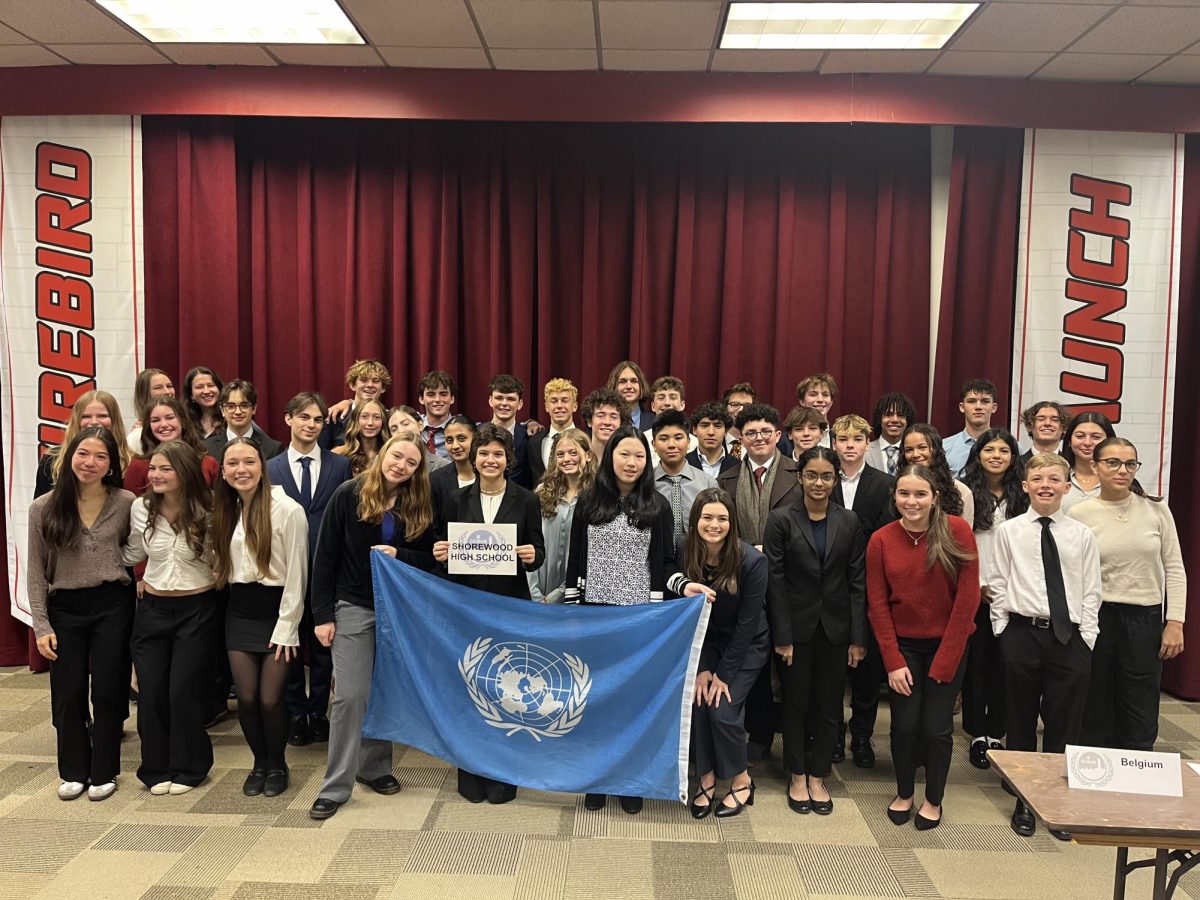On Friday, November 1, delegates from SHS departed for the annual Carthage College Model United Nations Conference (CCMUN). Due to Shorewood having more spots for the trip compared to other conferences later in the year, students of all grade levels were able to participate in the trip.
“Carthage is what’s called a teaching conference, so it’s a bit lower stakes and there are a lot of newer, less experienced delegates there,” said Andrina Roberts, senior and president of Model UN. “People are able to make more mistakes and get comfortable with Model UN.”
The conference invites 370 students from 21 schools across the state with the purpose of solving international issues and encouraging collaboration.
“[The conference] is a way for students to improve their skills of negotiation, working together with others, and learning about global issues representing a perspective that might be different from their own,” said Evan Schmidt, advisor. “They’re not expressing their points of view; they’re researching what their government’s position is, so that’s a really good exercise.”
For many underclassmen, the work done in preparation for the parliamentary procedure is unfamiliar before attending CCMUN.
“I [had] never really worked with writing out a resolution on a certain political issue in any of my classes, so it’s cool to see how that works,” said Laila Zietlow Leandro, sophomore.
On the other hand, experienced delegates are given the opportunity to reflect on their previous years at the conference and strive for improvement. Roberts, a member of the club for four years, sought to take advantage of this opportunity.
“When I was younger, I was a bit more intimidated by all the people at the conference,” Roberts said. “But now that it’s my fourth year doing this conference, I went in feeling really confident and I knew I was ready.”
With nothing to lose, Roberts brought in a different mindset to the conference this year.
“I told myself that this is my last Model UN conference of my high school career,” Roberts said. “I’m never going to see any of these people again, so I refused to let myself be intimidated.”
The opportunity to take on a new role at the conference presented itself to Zietlow Leandro.
“I was a signatory, which is a person who allows a resolution to be presented,” Zietlow Leandro said. “I didn’t have much of a job at Northwestern [Model UN last year], so it was more fun to be on a committee at Carthage.”
For the work put into researching for and participating in the conference, students earned awards.
“There are prizes for best delegates and best position papers,” Schmidt said. “We did have nine students win those awards. I’m very proud of them all for what they did.”
The fast-paced nature of the Carthage College conference, in particular, appeals to the delegates.
“In Northwestern [it] tends to drag on and we don’t really seem to get very much done, but we managed to pass a resolution in just two sessions at Carthage,” said Lukas Pluckhahn, junior.
Over time, delegates foster skills that aid them inside and outside of the classroom.
“The club has really evolved to give more inexperienced members more [of an] opportunity to develop their skills,” Pluckhahn said. “You have to really work collaboratively with others and be able to work under pressure. You have a lot of people challenging your knowledge and skills, and you have to be able to withstand that.”
Outside of the conference, students carry a collaborative mindset to their other activities.
“Something that Model UN teaches people is diplomacy and collaborating on issues and learning to find common ground, because not everyone’s views are going to be perfectly met and that is for the common good,” Roberts said. “I bring that mindset to Mock Trial because everybody reads the case a little differently but at the end of the day it’s about the story you sell as a team.”
According to Schmidt, student participation offers a glimpse of hope for the future.
“We clearly have students that care about global issues and who are passionate about Model UN, who are concerned about the way people are treated around the world today and the way people are going to be treated in the future,” Schmidt said. “That gives me a lot of hope and I hope that they feel empowered that they can effectuate change.”

